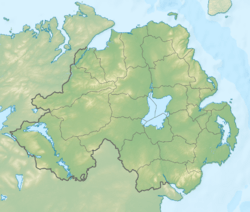Ballygawley land mine attack facts for kids
Quick facts for kids Ballygawley land mine attack |
|
|---|---|
| Part of the Troubles and Operation Banner | |

The approximate site of the attack (2006)
|
|
| Location | Near Ballygawley, County Tyrone, Northern Ireland |
| Coordinates | 54°31′42″N 7°12′39″W / 54.52833°N 7.21083°W |
| Date | 13 July 1983 |
| Target | Ulster Defence Regiment personnel |
|
Attack type
|
Improvised land mine |
| Deaths | 4 soldiers |
| Perpetrator | Provisional IRA |
The Ballygawley land mine attack happened on July 13, 1983, in Northern Ireland. During this event, four soldiers from the British Army's Ulster Defence Regiment (UDR) were killed. They were hit by a hidden bomb, called a land mine, planted by the Provisional Irish Republican Army (IRA) near Ballygawley. The soldiers were traveling in armored vehicles when the bomb exploded.
What Was Happening in Northern Ireland?
Since the 1970s, there was a period of conflict in Northern Ireland known as the Troubles. During this time, different groups had disagreements and sometimes used violence. The Provisional Irish Republican Army (IRA) was one group involved. They were carrying out a campaign against the British security forces.
The area around Ballygawley in County Tyrone was a place where many events happened during this time. People had used this road for ambushes for a long time. For example, in 1973, a British Army officer was killed by a large land mine on the same road. Also, a few months before this attack, an off-duty UDR soldier was killed in Ballygawley.
The Attack on the Soldiers
On the morning of July 13, 1983, soldiers from the 6th Battalion UDR were on their way to a training exercise. They were traveling in a group of five armored Land Rovers. As their vehicles were going down a hill near Ballygawley, a large land mine exploded.
The bomb weighed about 600 pounds (272 kg). It had been hidden under the road in a drainpipe. Someone set off the bomb from a distance. The explosion was so powerful that it threw the last vehicle into the air. It also made a very big hole in the road.
Three soldiers died right away because of the blast. A fourth soldier was badly hurt and died later in the hospital. The soldiers who lost their lives were Ronald Alexander (19), Thomas Harron (25), John Roxborough (19), and Oswell Neely (20). They were all young men from Northern Ireland.
Later, in 1988, another serious bomb attack happened on the same road. This was known as the Ballygawley bus bombing, where eight more British soldiers were killed.
See also
- Chronology of Provisional Irish Republican Army actions (1980–1989)
- Dungannon land mine attack
- Altnaveigh landmine attack
- Warrenpoint ambush
- Ballygawley bus bombing
- 1990 Downpatrick roadside bomb
 | James B. Knighten |
 | Azellia White |
 | Willa Brown |


